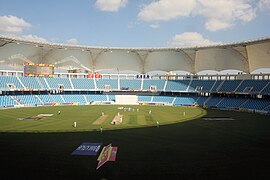Our website is made possible by displaying online advertisements to our visitors.
Please consider supporting us by disabling your ad blocker.
Dubai International Cricket Stadium
| Ring of Fire DSC | |||
 | |||
| Ground information | |||
|---|---|---|---|
| Coordinates | 25°2′48″N 55°13′8″E / 25.04667°N 55.21889°E | ||
| Establishment | 2009 | ||
| Capacity | 25,000[1] | ||
| Owner | Dubai Properties | ||
| Architect | Awsam Matloob | ||
| Operator | Dubai sports city | ||
| Tenants | |||
| End names | |||
| Emirates Road End Dubai Sports City End | |||
| International information | |||
| First Test | 12–16 November 2010: | ||
| Last Test | 24–27 November 2018: | ||
| First ODI | 22 April 2009: | ||
| Last ODI | 7 March 2024: | ||
| First T20I | 7 May 2009: | ||
| Last T20I | 21 December 2024: | ||
| Only WODI | 7 February 2019: | ||
| First WT20I | 26 September 2023: | ||
| Last WT20I | 20 October 2024: | ||
| Team information | |||
| |||
| As of 21 December 2024 Source: Cricinfo | |||

The Dubai International Stadium, formerly known as the Dubai Sports City Cricket Stadium, is a multi-purpose stadium in Dubai, United Arab Emirates. It is mainly used for cricket and is one of the three main cricket stadiums in the country, the other two being Sharjah Cricket Stadium in Sharjah and Sheikh Zayed Cricket Stadium in Abu Dhabi. It has seating capacity for 25,000 spectators, but is expandable to accommodate 30,000 spectators. It is a part of the Dubai Sports City in Dubai. The architect of this project was the Canadian architect, Awsam Matloob. The stadium was one of the dedicated venues for the 2021 ICC Men's T20 World Cup, it hosted Semi Final 2 and the Final on November 11, 2021 and November 14, 2021 respectively.
Previous Page Next Page
ملعب دبي الدولي للكريكت Arabic দুবাই আন্তর্জাতিক ক্রিকেট স্টেডিয়াম Bengali/Bangla Dubai International Cricket Stadium German Estadio de críquet de la Ciudad Deportiva de Dubái Spanish ورزشگاه بینالمللی دبی FA दुबई अंतरराष्ट्रीय क्रिकेट स्टेडियम HI Dubai International Cricket Stadium Italian दुबई आंतरराष्ट्रीय क्रिकेट स्टेडियम MR துபாய் பன்னாட்டுத் துடுப்பாட்ட அரங்கம் Tamil دبئی بین الاقوامی کرکٹ اسٹیڈیم UR


